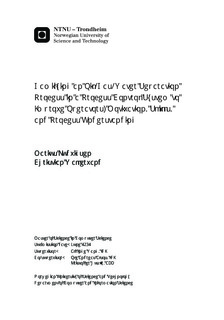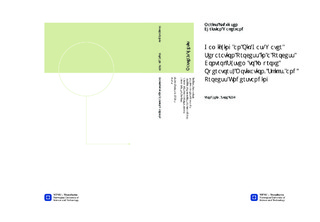| dc.contributor.advisor | Wang, Alf Inge | nb_NO |
| dc.contributor.advisor | Alsos, Ole Andreas | nb_NO |
| dc.contributor.advisor | Husøy, Kristoffer | nb_NO |
| dc.contributor.author | Ludvigsen, Marius | nb_NO |
| dc.contributor.author | Wallervand, Christian | nb_NO |
| dc.date.accessioned | 2014-12-19T13:39:07Z | |
| dc.date.available | 2014-12-19T13:39:07Z | |
| dc.date.created | 2012-11-08 | nb_NO |
| dc.date.issued | 2012 | nb_NO |
| dc.identifier | 566274 | nb_NO |
| dc.identifier | ntnudaim:7344 | nb_NO |
| dc.identifier.uri | http://hdl.handle.net/11250/252990 | |
| dc.description.abstract | Serious games and its related fields have lately received a lot of interest due to their potential for training and education. Serious games can be defined as (digital) games that are used for reasons other than entertainment. Gamification can be related to serious games and can be defined as the process of game-thinking and game mechanics to engage users and solve problems.The initiator of this project was ABB. ABB delivers a process control system used to control the processes of an oil production facility. One of these processes is separating oil and gas from water. A simulator of this separation process was developed and then implemented into HawkEye, a prototype of the existing process control system. We have worked with ABB to gamify the implemented separation process using different game mechanics to discover whether gamification can be used to improve a process operator's skills, understanding, and motivation. In a process control system, the process at hand has the highest priority due to its severity, which means that the gamified elements have to be subtle.The implemented separation process was tested on two groups consisting of ten people each, most of them students. The two groups carried out the separation process twice, one time without the gamified elements and one time with the gamified elements. The difference between the two groups was in which order they did the separation process.After the experiment, data was gathered from the implemented system, and also from a survey, a quiz and interviews that we conducted. These data were analysed to determine if the gamified separation process yielded better results than the non-gamified separation process. Results from the experiments showed that there was no improvement in the participants' skill or understanding because of gamification, but that the gamified elements had a positive effect on both groups' motivation. | nb_NO |
| dc.language | eng | nb_NO |
| dc.publisher | Institutt for datateknikk og informasjonsvitenskap | nb_NO |
| dc.subject | ntnudaim:7344 | no_NO |
| dc.subject | MTDT datateknikk | no_NO |
| dc.subject | Spillteknologi | no_NO |
| dc.title | Gamifying an Oil-Gas-Water Separation Process in a Process Control System to Improve Operators' Motivation, Skills, and Process Understanding | nb_NO |
| dc.type | Master thesis | nb_NO |
| dc.source.pagenumber | 132 | nb_NO |
| dc.contributor.department | Norges teknisk-naturvitenskapelige universitet, Fakultet for informasjonsteknologi, matematikk og elektroteknikk, Institutt for datateknikk og informasjonsvitenskap | nb_NO |

